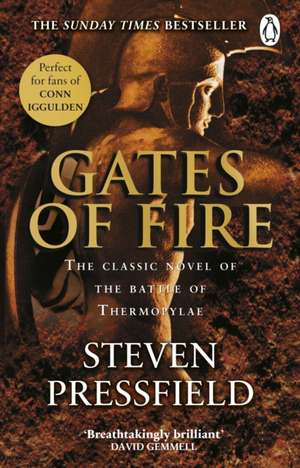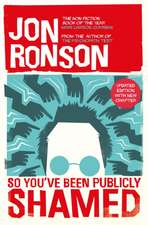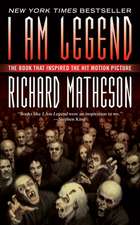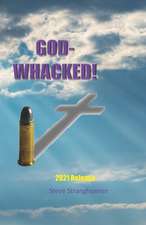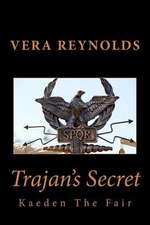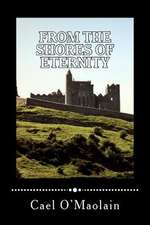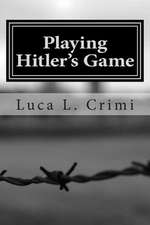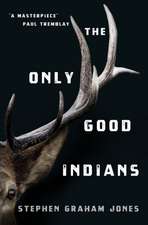Gates Of Fire
Autor Steven Pressfielden Limba Engleză Paperback – 19 noi 2020
At Thermopylae, a rocky mountain pass in northern Greece, the feared and admired Spartan soldiers stood three hundred strong. Theirs was a suicide mission, to hold the pass against the invading millions of the mighty Persian army.
Day after bloody day they withstood the terrible onslaught, buying time for the Greeks to rally their forces. Born into a cult of spiritual courage, physical endurance, and unmatched battle skill, the Spartans would be remembered for the greatest military stand in history--one that would not end until the rocks were awash with blood, leaving only one gravely injured Spartan squire to tell the tale....
From the Paperback edition.
| Toate formatele și edițiile | Preț | Express |
|---|---|---|
| Paperback (3) | 57.71 lei 3-5 săpt. | +9.66 lei 6-10 zile |
| Bantam Books – 31 aug 1999 | 57.71 lei 3-5 săpt. | +9.66 lei 6-10 zile |
| Transworld Publishers Ltd – 19 noi 2020 | 61.05 lei 23-34 zile | +25.28 lei 6-10 zile |
| Bantam Books – 31 aug 2005 | 104.58 lei 3-5 săpt. |
Preț: 61.05 lei
Preț vechi: 71.26 lei
-14% Nou
Puncte Express: 92
Preț estimativ în valută:
11.68€ • 12.73$ • 9.84£
11.68€ • 12.73$ • 9.84£
Carte disponibilă
Livrare economică 04-15 aprilie
Livrare express 18-22 martie pentru 35.27 lei
Preluare comenzi: 021 569.72.76
Specificații
ISBN-13: 9780857504623
ISBN-10: 0857504622
Pagini: 528
Dimensiuni: 127 x 196 x 34 mm
Greutate: 0.37 kg
Editura: Transworld Publishers Ltd
ISBN-10: 0857504622
Pagini: 528
Dimensiuni: 127 x 196 x 34 mm
Greutate: 0.37 kg
Editura: Transworld Publishers Ltd
Notă biografică
Steven Pressfield
Extras
I had always wondered what it felt like to die.
There was an exercise we of the battle train practiced when we served as punching bags for the Spartan heavy infantry. It was called the Oak because we took our positions along a line of oaks at the edge of the plain of Otona, where the Spartiates and the Gentleman-Rankers ran their field exercises in fall and winter. We would line up ten deep with body-length wicker shields braced upon the earth and they would hit us, the shock troops, coming across the flat in line of battle, eight deep, at a walk, then a pace, then a trot and finally a dead run. The shock of their interleaved shields was meant to knock the breath out of you, and it did. It was like being hit by a mountain. Your knees, no matter how braced you held them, buckled like saplings before an earthslide; in an instant all courage fled our hearts; we were rooted up like dried stalks before the ploughman's blade.
That was how it felt to die. The weapon which slew me at Thermopylae was an Egyptian hoplite spear, driven in beneath the plexus of the ribcage. But the sensation was not what one would have anticipated, not being pierced but rather slammed, like we sparring fodder felt beneath the oaks.
I had imagined that the dead would be detached. That they would look upon life with the eyes of objective wisdom. But the experience proved the opposite. Emotion ruled. It seemed nothing remained but emotion. My heart ached and broke as never it could on earth. Loss encompassed me with a searing, all-mastering pain. I saw my wife and children, my dear cousin Diomache, she whom I loved. I saw Skamandridas, my father, and Eunike, my mother, Bruxieus, Dekton and "Suicide," names which mean nothing to His Majesty to hear, but which to me were dearer than life and now, dying, dearer still.
Away they flew. Away I flew from them.
I was keenly conscious of the comrades-in-arms who had fallen with me. A bond surpassing by a hundredfold that which I had known in life bound me to them. I felt a sense of inexpressible relief and realized that I had feared, more than death, separation from them. I apprehended that excruciating war survivor's torment, the sense of isolation and self-betrayal experienced by those who had elected to cling yet to breath when their comrades had let loose their grip.
That state which we call life was over.
I was dead.
And yet, titanic as was that sense of loss, there existed a keener one which I now experienced and felt my brothers-in-arms feeling with me. It was this.
That our story would perish with us.
That no one would ever know.
I cared not for myself, for my own selfish or vainglorious purposes, but for them. For Leonidas, for Alexandros and Polynikes, for Arete bereft by her hearth and, most of all, for Dienekes. That his valor, his wit, his private thoughts that I alone was privileged to share, that these and all that he and his companions had achieved and suffered would simply vanish, drift away like smoke from a woodland fire, this was unbearable.
We had reached the river now. We could hear with ears that were no longer ears and see with eyes that were no longer eyes the stream of Lethe and the hosts of the long-suffering dead whose round beneath the earth was at last drawing to a period. They were returning to life, drinking of those waters which would efface all memory of their existence here as shades.
But we from Thermopylae, we were aeons away from drinking of Lethe's stream. We remembered.
A cry which was not a cry but only the multiplied pain of the warriors' hearts, all feeling what I, too, felt, rent the baleful scene with unspeakable pathos.
Then from behind me, if there can be such a thing as "behind" in that world where all directions are as one, came a glow of such sublimity that I knew, we all knew at once, it could be nothing but a god.
Phoebus Far Darter, Apollo himself in war armor, moved there among the Spartiates and Thespaians. No words were exchanged; none were needed. The Archer could feel the men's agony and they knew without speech that he, warrior and physician, was there to succor it. So quickly that surprise was impossible I felt his eye turn toward me, me the last and least who could expect it, and then Dienekes himself was beside me, my master in life.
I would be the one. The one to go back and speak. A pain beyond all previous now seized me. Sweet life itself, even the desperately sought chance to tell the tale, suddenly seemed unendurable alongside the pain of having to take leave of these whom I had come so to love.
But again, before the god's majesty, no entreaty was possible.
I saw another light, a sicklier, cruder, more coarse illumination, and knew that it was the sun. I was soaring back. Voices came to me through physical ears. Soldiers' speech, in Egyptian and Persian, and leather-gauntleted fists pulling me from beneath a sheaf of corpses.
The Egyptian marines told me later that I had uttered the word lokas, which in their tongue meant "fuck," and they had laughed even as they dragged my shattered body out into the light of day.
They were wrong. The word was Loxias--the Greek title of respect for Apollo the Cunning, or Apollo Crabwise, whose oracles arise ever elusive and oblique--and I was half crying to him, half cursing him for laying this terrible responsibility on me who had no gift to perform it.
As poets call upon the Muse to speak through them, I croaked my inarticulate grunt to the Striker From Afar.
If indeed you have elected me, Archer, then let your fine-fletched arrows spring from my bow. Lend me your voice, Far Darter. Help me to tell the tale.
Thermopylae is a spa. The word in Greek means "hot gates," from the thermal springs and, as His Majesty knows, the narrow and precipitous defiles which form the only passages by which the site may be approached--in Greek, pylae or pylai, the East and West Gates.
The Phokian Wall around which so much of the most desperate fighting took place was not constructed by the Spartans and their allies in the event, but stood in existence prior to the battle, erected in ancient times by the inhabitants of Phokis and Lokris as defense against the incursions of their northern neighbors, the Thessalians and Macedonians. The wall, when the Spartans arrived to take possession of the pass, stood in ruins. They rebuilt it.
The springs and pass themselves are not considered by the Hellenes to belong to the natives of the area, but are open to all in Greece. The baths are thought to possess curative powers; in summer the site teems with visitors. His Majesty beheld the charm of the shaded groves and pool houses, the oak copse sacred to Amphiktyon and that pleasantly meandering path bounded by the Lion's Wall, whose stones are said to have been set in place by Herakles himself. Along this in peacetime are customarily arrayed the gaily colored tents and booths used by the vendors from Trachis, Anthela and Alpenoi to serve whatever adventurous pilgrims have made the trek to the mineral baths.
There is a double spring sacred to Persephone, called the Skyllian fountain, at the foot of the bluff beside the Middle Gate. Upon this site the Spartans established their camp, between the Phokian Wall and the hillock where the final tooth-and-nail struggle took place. His Majesty knows how little drinking water is to hand from other sources in the surrounding mountains. The earth between the Gates is normally so parched and dust-blown that servants are employed by the spa to oil the walkways for the convenience of the bathers. The ground itself is hard as stone.
His Majesty saw how swiftly that marble-hard clay was churned into muck by the contending masses of the warriors. I have never seen such mud and of such depth, whose moisture came only from the blood and terror-piss of the men who fought upon it.
When the advance troops, the Spartan rangers, arrived at Thermopylae prior to the battle, a few hours before the main body which was advancing by forced march, they discovered, incredibly, two parties of spa-goers, one from Tiryns, the other from Halkyon, thirty in all, men and women, each in their separate precincts, in various states of undress. These pilgrims were startled, to say the least, by the sudden appearance in their midst of the scarlet-clad armored Skiritai, all picked men under thirty, chosen for speed of foot as well as prowess in mountain fighting. The rangers cleared the bathers and their attendant perfume vendors, masseurs, fig-cake and bread sellers, bath and oil girls, strigil boys and so forth (who had ample intelligence of the Persian advance but had thought that the recent down-valley storm had rendered the northern approaches temporarily impassable). The rangers confiscated all food, soaps, linens and medical accoutrements and in particular the spa tents, which later appeared so grimly incongruous, billowing festively above the carnage. The rangers reerected these shelters at the rear, in the Spartan camp beside the Middle Gate, intending them for use by Leonidas and his royal guard.
The Spartan king, when he arrived, refused to avail himself of this shelter, deeming it unseemly. The Spartiate heavy infantry likewise rejected these amenities. The tents fell, in one of the ironies to which those familiar with war are accustomed, to the use of the Spartan helots, Thespaian, Phokian and Opountian Lokrian slaves and other attendants of the battle train who suffered wounds in the arrow and missile barrages. These individuals, too, after the second day refused to accept shelter. The brightly colored spa tents of Egyptian linen, now in tatters, came as His Majesty saw to protect only the beasts of transport, the mules and asses supporting the commissariat, who became terrorized by the sights and smells of the battle and could not be held by their teamsters. In the end the tents were torn to rags to bind the wounds of the Spartiates and their allies.
When I say Spartiates, I mean the formal term in Greek, Spartiatai, which refers to Lakedaemonians of the superior class, full Spartans--the homoioi--Peers or Equals. None of the class called Gentleman-Rankers or of the perioikoi, the secondary Spartans of less than full citizenship, or those enlisted from the surrounding Lakedaemonian towns, fought at the Hot Gates, though toward the end when the surviving Spartiates became so few that they could no longer form a fighting front, a certain "leavening element," as Dienekes expressed it, of freed slaves, armor bearers and battle squires, was permitted to fill the vacated spaces.
His Majesty may nonetheless take pride in knowing that his forces defeated the flower of Hellas, the cream of her finest and most valiant fighting men.
As for my own position within the battle train, the explanation may require a certain digression, with which I hope His Majesty will be patient.
I was captured at age twelve (or, more accurately, surrendered) as a heliokekaumenos, a Spartan term of derision which means literally "scorched by the sun." It referred to a type of nearly feral youth, burned black as Ethiopians by their exposure to the elements, with which the mountains abounded in those days preceding and following the first Persian War. I was cast originally among the Spartan helots, the serf class that the Lakedaemonians had created from the inhabitants of Messenia and Helos after they in centuries past had conquered and enslaved them. These husbandmen, however, rejected me because of certain physical impairments which rendered me useless for field labor. Also the helots hated and mistrusted any foreigner among them who might prove an informer. I lived a dog's life for most of a year before fate, luck or a god's hand delivered me into the service of Alexandros, a Spartan youth and protege of Dienekes. This saved my life. I was recognized at least ironically as a freeborn and, evincing such qualities of a wild beast as the Lakedaemonians found admirable, was elevated to the status of parastates pais, a sort of sparring partner for the youths enrolled in the agoge, the notorious and pitiless thirteen-year training regimen which turned boys into Spartan warriors.
Every heavy infantryman of the Spartiate class travels to war attended by at least one helot. Enomotarchai, the platoon leaders, take two. This latter was Dienekes' station. It is not uncommon for an officer of his rank to select as his primary attendant, his battle squire, a freeborn foreigner or even a young mothax, a noncitizen or bastard Spartan still in agoge training. It was my fortune, for good or ill, to be chosen by my master for this post. I supervised the care and transport of his armor, maintained his kit, prepared his food and sleeping site, bound his wounds and in general performed every task necessary to leave him free to train and fight.
My childhood home, before fate set me upon the road which found its end at the Hot Gates, was originally in Astakos in Akarnania, north of the Peloponnese, where the mountains look west over the sea toward Kephallinia and, beyond the horizon, to Sikelia and Italia.
The island of Ithaka, home of Odysseus of lore, lay within sight across the straits, though I myself was never privileged to touch the hero's sacred soil, as a boy or later. I was due to make the crossing, a treat from my aunt and uncle, on the occasion of my tenth birthday. But our city fell first, the males of my clan were slaughtered and females sold into slavery, our ancestral land taken, and I cast out, alone save my cousin Diomache, without family or home, three days before the start of my tenth year to heaven, as the poet says.
From the Paperback edition.
There was an exercise we of the battle train practiced when we served as punching bags for the Spartan heavy infantry. It was called the Oak because we took our positions along a line of oaks at the edge of the plain of Otona, where the Spartiates and the Gentleman-Rankers ran their field exercises in fall and winter. We would line up ten deep with body-length wicker shields braced upon the earth and they would hit us, the shock troops, coming across the flat in line of battle, eight deep, at a walk, then a pace, then a trot and finally a dead run. The shock of their interleaved shields was meant to knock the breath out of you, and it did. It was like being hit by a mountain. Your knees, no matter how braced you held them, buckled like saplings before an earthslide; in an instant all courage fled our hearts; we were rooted up like dried stalks before the ploughman's blade.
That was how it felt to die. The weapon which slew me at Thermopylae was an Egyptian hoplite spear, driven in beneath the plexus of the ribcage. But the sensation was not what one would have anticipated, not being pierced but rather slammed, like we sparring fodder felt beneath the oaks.
I had imagined that the dead would be detached. That they would look upon life with the eyes of objective wisdom. But the experience proved the opposite. Emotion ruled. It seemed nothing remained but emotion. My heart ached and broke as never it could on earth. Loss encompassed me with a searing, all-mastering pain. I saw my wife and children, my dear cousin Diomache, she whom I loved. I saw Skamandridas, my father, and Eunike, my mother, Bruxieus, Dekton and "Suicide," names which mean nothing to His Majesty to hear, but which to me were dearer than life and now, dying, dearer still.
Away they flew. Away I flew from them.
I was keenly conscious of the comrades-in-arms who had fallen with me. A bond surpassing by a hundredfold that which I had known in life bound me to them. I felt a sense of inexpressible relief and realized that I had feared, more than death, separation from them. I apprehended that excruciating war survivor's torment, the sense of isolation and self-betrayal experienced by those who had elected to cling yet to breath when their comrades had let loose their grip.
That state which we call life was over.
I was dead.
And yet, titanic as was that sense of loss, there existed a keener one which I now experienced and felt my brothers-in-arms feeling with me. It was this.
That our story would perish with us.
That no one would ever know.
I cared not for myself, for my own selfish or vainglorious purposes, but for them. For Leonidas, for Alexandros and Polynikes, for Arete bereft by her hearth and, most of all, for Dienekes. That his valor, his wit, his private thoughts that I alone was privileged to share, that these and all that he and his companions had achieved and suffered would simply vanish, drift away like smoke from a woodland fire, this was unbearable.
We had reached the river now. We could hear with ears that were no longer ears and see with eyes that were no longer eyes the stream of Lethe and the hosts of the long-suffering dead whose round beneath the earth was at last drawing to a period. They were returning to life, drinking of those waters which would efface all memory of their existence here as shades.
But we from Thermopylae, we were aeons away from drinking of Lethe's stream. We remembered.
A cry which was not a cry but only the multiplied pain of the warriors' hearts, all feeling what I, too, felt, rent the baleful scene with unspeakable pathos.
Then from behind me, if there can be such a thing as "behind" in that world where all directions are as one, came a glow of such sublimity that I knew, we all knew at once, it could be nothing but a god.
Phoebus Far Darter, Apollo himself in war armor, moved there among the Spartiates and Thespaians. No words were exchanged; none were needed. The Archer could feel the men's agony and they knew without speech that he, warrior and physician, was there to succor it. So quickly that surprise was impossible I felt his eye turn toward me, me the last and least who could expect it, and then Dienekes himself was beside me, my master in life.
I would be the one. The one to go back and speak. A pain beyond all previous now seized me. Sweet life itself, even the desperately sought chance to tell the tale, suddenly seemed unendurable alongside the pain of having to take leave of these whom I had come so to love.
But again, before the god's majesty, no entreaty was possible.
I saw another light, a sicklier, cruder, more coarse illumination, and knew that it was the sun. I was soaring back. Voices came to me through physical ears. Soldiers' speech, in Egyptian and Persian, and leather-gauntleted fists pulling me from beneath a sheaf of corpses.
The Egyptian marines told me later that I had uttered the word lokas, which in their tongue meant "fuck," and they had laughed even as they dragged my shattered body out into the light of day.
They were wrong. The word was Loxias--the Greek title of respect for Apollo the Cunning, or Apollo Crabwise, whose oracles arise ever elusive and oblique--and I was half crying to him, half cursing him for laying this terrible responsibility on me who had no gift to perform it.
As poets call upon the Muse to speak through them, I croaked my inarticulate grunt to the Striker From Afar.
If indeed you have elected me, Archer, then let your fine-fletched arrows spring from my bow. Lend me your voice, Far Darter. Help me to tell the tale.
Thermopylae is a spa. The word in Greek means "hot gates," from the thermal springs and, as His Majesty knows, the narrow and precipitous defiles which form the only passages by which the site may be approached--in Greek, pylae or pylai, the East and West Gates.
The Phokian Wall around which so much of the most desperate fighting took place was not constructed by the Spartans and their allies in the event, but stood in existence prior to the battle, erected in ancient times by the inhabitants of Phokis and Lokris as defense against the incursions of their northern neighbors, the Thessalians and Macedonians. The wall, when the Spartans arrived to take possession of the pass, stood in ruins. They rebuilt it.
The springs and pass themselves are not considered by the Hellenes to belong to the natives of the area, but are open to all in Greece. The baths are thought to possess curative powers; in summer the site teems with visitors. His Majesty beheld the charm of the shaded groves and pool houses, the oak copse sacred to Amphiktyon and that pleasantly meandering path bounded by the Lion's Wall, whose stones are said to have been set in place by Herakles himself. Along this in peacetime are customarily arrayed the gaily colored tents and booths used by the vendors from Trachis, Anthela and Alpenoi to serve whatever adventurous pilgrims have made the trek to the mineral baths.
There is a double spring sacred to Persephone, called the Skyllian fountain, at the foot of the bluff beside the Middle Gate. Upon this site the Spartans established their camp, between the Phokian Wall and the hillock where the final tooth-and-nail struggle took place. His Majesty knows how little drinking water is to hand from other sources in the surrounding mountains. The earth between the Gates is normally so parched and dust-blown that servants are employed by the spa to oil the walkways for the convenience of the bathers. The ground itself is hard as stone.
His Majesty saw how swiftly that marble-hard clay was churned into muck by the contending masses of the warriors. I have never seen such mud and of such depth, whose moisture came only from the blood and terror-piss of the men who fought upon it.
When the advance troops, the Spartan rangers, arrived at Thermopylae prior to the battle, a few hours before the main body which was advancing by forced march, they discovered, incredibly, two parties of spa-goers, one from Tiryns, the other from Halkyon, thirty in all, men and women, each in their separate precincts, in various states of undress. These pilgrims were startled, to say the least, by the sudden appearance in their midst of the scarlet-clad armored Skiritai, all picked men under thirty, chosen for speed of foot as well as prowess in mountain fighting. The rangers cleared the bathers and their attendant perfume vendors, masseurs, fig-cake and bread sellers, bath and oil girls, strigil boys and so forth (who had ample intelligence of the Persian advance but had thought that the recent down-valley storm had rendered the northern approaches temporarily impassable). The rangers confiscated all food, soaps, linens and medical accoutrements and in particular the spa tents, which later appeared so grimly incongruous, billowing festively above the carnage. The rangers reerected these shelters at the rear, in the Spartan camp beside the Middle Gate, intending them for use by Leonidas and his royal guard.
The Spartan king, when he arrived, refused to avail himself of this shelter, deeming it unseemly. The Spartiate heavy infantry likewise rejected these amenities. The tents fell, in one of the ironies to which those familiar with war are accustomed, to the use of the Spartan helots, Thespaian, Phokian and Opountian Lokrian slaves and other attendants of the battle train who suffered wounds in the arrow and missile barrages. These individuals, too, after the second day refused to accept shelter. The brightly colored spa tents of Egyptian linen, now in tatters, came as His Majesty saw to protect only the beasts of transport, the mules and asses supporting the commissariat, who became terrorized by the sights and smells of the battle and could not be held by their teamsters. In the end the tents were torn to rags to bind the wounds of the Spartiates and their allies.
When I say Spartiates, I mean the formal term in Greek, Spartiatai, which refers to Lakedaemonians of the superior class, full Spartans--the homoioi--Peers or Equals. None of the class called Gentleman-Rankers or of the perioikoi, the secondary Spartans of less than full citizenship, or those enlisted from the surrounding Lakedaemonian towns, fought at the Hot Gates, though toward the end when the surviving Spartiates became so few that they could no longer form a fighting front, a certain "leavening element," as Dienekes expressed it, of freed slaves, armor bearers and battle squires, was permitted to fill the vacated spaces.
His Majesty may nonetheless take pride in knowing that his forces defeated the flower of Hellas, the cream of her finest and most valiant fighting men.
As for my own position within the battle train, the explanation may require a certain digression, with which I hope His Majesty will be patient.
I was captured at age twelve (or, more accurately, surrendered) as a heliokekaumenos, a Spartan term of derision which means literally "scorched by the sun." It referred to a type of nearly feral youth, burned black as Ethiopians by their exposure to the elements, with which the mountains abounded in those days preceding and following the first Persian War. I was cast originally among the Spartan helots, the serf class that the Lakedaemonians had created from the inhabitants of Messenia and Helos after they in centuries past had conquered and enslaved them. These husbandmen, however, rejected me because of certain physical impairments which rendered me useless for field labor. Also the helots hated and mistrusted any foreigner among them who might prove an informer. I lived a dog's life for most of a year before fate, luck or a god's hand delivered me into the service of Alexandros, a Spartan youth and protege of Dienekes. This saved my life. I was recognized at least ironically as a freeborn and, evincing such qualities of a wild beast as the Lakedaemonians found admirable, was elevated to the status of parastates pais, a sort of sparring partner for the youths enrolled in the agoge, the notorious and pitiless thirteen-year training regimen which turned boys into Spartan warriors.
Every heavy infantryman of the Spartiate class travels to war attended by at least one helot. Enomotarchai, the platoon leaders, take two. This latter was Dienekes' station. It is not uncommon for an officer of his rank to select as his primary attendant, his battle squire, a freeborn foreigner or even a young mothax, a noncitizen or bastard Spartan still in agoge training. It was my fortune, for good or ill, to be chosen by my master for this post. I supervised the care and transport of his armor, maintained his kit, prepared his food and sleeping site, bound his wounds and in general performed every task necessary to leave him free to train and fight.
My childhood home, before fate set me upon the road which found its end at the Hot Gates, was originally in Astakos in Akarnania, north of the Peloponnese, where the mountains look west over the sea toward Kephallinia and, beyond the horizon, to Sikelia and Italia.
The island of Ithaka, home of Odysseus of lore, lay within sight across the straits, though I myself was never privileged to touch the hero's sacred soil, as a boy or later. I was due to make the crossing, a treat from my aunt and uncle, on the occasion of my tenth birthday. But our city fell first, the males of my clan were slaughtered and females sold into slavery, our ancestral land taken, and I cast out, alone save my cousin Diomache, without family or home, three days before the start of my tenth year to heaven, as the poet says.
From the Paperback edition.
Recenzii
"Steven Pressfield brings the battle of Thermopylae to brilliant life, and he does for that war what Charles Frazier did for the Civil War in Cold Mountain."
--Pat Conroy
"Gripping and swashbuckling...an exciting, romantic, star-crossed story."
--The New York Times
"An incredibly gripping, moving, and literate work of art. Rarely does an author manage to re-create a moment in history with such mastery, authority, and psychological insight."
--Nelson DeMille
"A novel that is intricate and arresting and, once begun, almost impossible to put down."
--Daily News
"A timeless epic of man and war...Pressfield has created a new classic deserving of a place beside the very best of the old."
--Stephen Coonts
From the Paperback edition.
--Pat Conroy
"Gripping and swashbuckling...an exciting, romantic, star-crossed story."
--The New York Times
"An incredibly gripping, moving, and literate work of art. Rarely does an author manage to re-create a moment in history with such mastery, authority, and psychological insight."
--Nelson DeMille
"A novel that is intricate and arresting and, once begun, almost impossible to put down."
--Daily News
"A timeless epic of man and war...Pressfield has created a new classic deserving of a place beside the very best of the old."
--Stephen Coonts
From the Paperback edition.
Textul de pe ultima copertă
At Thermopylae, a rocky mountain pass in northern Greece, the feared and admired Spartan soldiers stood three hundred strong. Theirs was a suicide mission, to hold the pass against the invading millions of the mighty Persian army. Day after bloody day they withstood the terrible onslaught, buying time for the Greeks to rally their forces. Born into a cult of spiritual courage, physical endurance, and unmatched battle skill, the Spartans would be remembered for the greatest military stand in history -- one that would not end until the rocks were awash with blood, leaving only one gravely injured Spartan squire to tell the tale....
Descriere
Descriere de la o altă ediție sau format:
In 480 B.C., two million Persian invaders come to the mountain pass of Thermopylae in eastern Greece, where they are met by 300 of Sparta's finest warriors. The Greek loyalists battle for six days in a prelude to their ultimate victory. "Pressfield brings the battle of Thermopylae to brilliant life, and he does for that war what Charles Frazier did for the Civil War in "Cold Mountain.""--Pat Conroy.
In 480 B.C., two million Persian invaders come to the mountain pass of Thermopylae in eastern Greece, where they are met by 300 of Sparta's finest warriors. The Greek loyalists battle for six days in a prelude to their ultimate victory. "Pressfield brings the battle of Thermopylae to brilliant life, and he does for that war what Charles Frazier did for the Civil War in "Cold Mountain.""--Pat Conroy.
